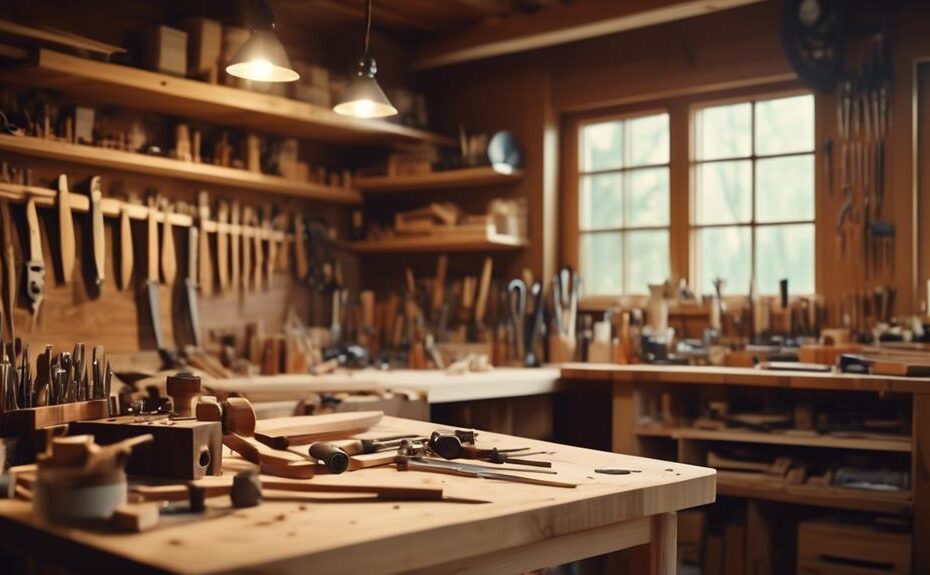Choosing the perfect workshop woodworking plan is essential for a successful project. Whether you're a seasoned woodworker or just starting out, these plans provide a solid foundation for designing furniture and crafting intricate wooden structures.
In this discussion, we'll explore the benefits of using workshop woodworking plans, offer tips for selecting the right plan, and provide valuable insights for executing these plans with precision.
Join us as we delve into the world of workshop woodworking plans and discover how they can enhance your woodworking journey.
Key Takeaways
- Workshop woodworking plans help ensure safety in the workshop by providing guidelines for organizing tools and materials.
- These plans optimize workshop space and maximize efficiency and productivity.
- Choosing the right woodworking plan involves considering the steps and materials required, as well as having the essential tools for following the plan.
- Successfully executing workshop woodworking plans requires careful planning, attention to detail, and investing in high-quality tools for more precise results.
Types of Workshop Woodworking Plans
There are various types of woodworking plans that cater specifically to different workshop settings and projects. When it comes to workshop woodworking, there are a few popular projects that woodworkers often undertake. These include building workbenches, storage cabinets, and tool chests.
Workbenches are essential for any woodworking project as they provide a sturdy surface for cutting, assembling, and sanding.
Storage cabinets help keep the workshop organized by providing ample space to store tools, materials, and supplies.
Tool chests are designed to safely store and transport various hand tools, ensuring they are easily accessible and protected from damage.
To undertake these projects, there are essential tools that every woodworker should have in their workshop. These include a table saw, miter saw, router, drill press, and various hand tools such as chisels, planes, and clamps. These tools are crucial for accurate and efficient woodworking.
Benefits of Using Workshop Woodworking Plans
Woodworking plans provide numerous benefits for workshop projects. They allow woodworkers to efficiently and accurately execute their tasks while ensuring optimal results.
One of the key benefits of using woodworking plans is the importance of safety in workshop woodworking. By following a detailed plan, woodworkers can identify potential hazards, such as sharp tools, heavy machinery, and electrical equipment. They can then take the necessary precautions to prevent accidents.
Another benefit of woodworking plans is that they help optimize workshop space for woodworking projects. These plans provide guidelines on organizing tools, materials, and workstations, maximizing efficiency and productivity. With a well-organized workspace, woodworkers can easily access tools and materials, reduce clutter, and have a clear layout for smooth workflow.
How to Choose the Right Workshop Woodworking Plan

When selecting a workshop woodworking plan, it is crucial to consider various factors to ensure a successful and efficient project. Avoiding common mistakes in choosing workshop woodworking plans is essential for achieving desired results. One mistake to avoid is selecting plans that are too advanced or beyond your skill level. It is important to choose plans that match your experience and abilities to avoid frustration and potential accidents. Another mistake to avoid is not thoroughly reviewing the plan before starting the project. Take the time to carefully read through the plan, understanding the steps and materials required.
To follow workshop woodworking plans effectively, it is important to have the essential tools. These tools include a tape measure for accurate measurements, a table saw for cutting wood, a chisel for shaping and carving, and a sander for smoothing surfaces. Additionally, having clamps, a hammer, and a drill will greatly assist in the assembly process. By considering these factors and having the necessary tools, you can confidently choose and follow workshop woodworking plans to create beautiful and functional pieces.
| Common Mistakes in Choosing Workshop Woodworking Plans | Essential Tools for Following Workshop Woodworking Plans |
|---|---|
| Selecting plans beyond skill level | Tape measure |
| Not reviewing plans thoroughly before starting | Table saw |
| Chisel | |
| Sander | |
| Clamps | |
| Hammer | |
| Drill |
Tips for Successfully Executing Workshop Woodworking Plans
To successfully execute workshop woodworking plans, it is essential to approach the project with careful planning and attention to detail. One of the most common mistakes made when working on woodworking projects is rushing through the planning stage. Taking the time to fully understand the plans and visualize the finished product will greatly increase the chances of success.
Additionally, having the essential tools for the job is crucial. These may include a table saw, miter saw, chisels, and clamps, among others. Investing in high-quality tools will not only make the work easier but also ensure more precise and accurate results.
Frequently Asked Questions
Are There Any Specific Tools or Equipment Required for Workshop Woodworking Plans?
Specific tools and equipment are necessary for workshop woodworking plans. Depending on the project, requirements may include saws, drills, chisels, measuring tools, and more. Customized dimensions and personal preferences may also dictate the tools needed.
Can Workshop Woodworking Plans Be Customized to Fit Specific Dimensions or Preferences?
Workshop woodworking plans can indeed be customized to fit specific dimensions or preferences. With options for customizing dimensions and personalization, individuals can tailor their projects to suit their unique needs and create truly bespoke pieces.
What Level of Woodworking Experience Is Necessary to Successfully Execute Workshop Woodworking Plans?
Successfully executing workshop woodworking plans requires a certain level of woodworking experience and skills. It is important to have a solid understanding of woodworking techniques, tools, and materials to ensure the project's accuracy and quality.
Are There Any Safety Guidelines or Precautions That Should Be Followed When Working on Workshop Woodworking Plans?
Woodworking safety tips are crucial for anyone working on woodworking projects. It is of utmost importance to follow safety guidelines to prevent accidents and ensure a successful outcome.
Can Workshop Woodworking Plans Be Used for Commercial Purposes or Are They Strictly for Personal Use?
When considering the monetization of workshop woodworking plans, it is crucial to understand the legal considerations involved in selling these plans for commercial purposes. These factors must be carefully examined and adhered to in order to ensure compliance with relevant laws and regulations.
Conclusion
In conclusion, workshop woodworking plans serve as a valuable resource for individuals looking to engage in woodworking projects. By providing detailed instructions and guidance, these plans enable woodworkers to successfully execute their projects with precision and efficiency.
Choosing the right plan is crucial, as it ensures that the project aligns with one's skill level and desired outcome. Just like a compass guiding a sailor through uncharted waters, workshop woodworking plans navigate woodworkers towards their desired woodworking destination.




